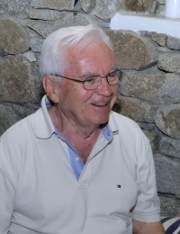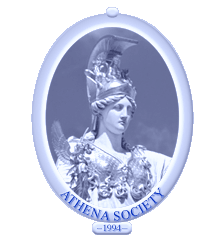The Birth of the Athena Society
By Basil Doumas
 In 1992, at the AACC meeting in Chicago, I was seated next to Jack Ladenson at the Clinical Chemistry Board of Editors dinner. At some point he asked me why I always spend my summer vacation in Greece. I said that I had family there and that the Aegean Sea and islands were beautiful.
In 1992, at the AACC meeting in Chicago, I was seated next to Jack Ladenson at the Clinical Chemistry Board of Editors dinner. At some point he asked me why I always spend my summer vacation in Greece. I said that I had family there and that the Aegean Sea and islands were beautiful.
The next thing Jack wanted to know whether it would be possible to have a meeting on some island in which we could combine some presentations about laboratory medicine along with frequent informal interactions. The "presentations" would be limited to no more than 4 hours/day leaving plenty of free time for frequent interactions in a relaxing environment. The idea was to invite a small group of selected colleagues, about 25 to begin with, to discuss Laboratory Medicine, its present status in the U.S. and other countries of the world, new developments, and make projections about the future of our profession.
When I told Jack that his idea was great, he proceeded with "the specifics." This "entity" (it was not baptized that night) will have minimal overhead and therefore no structure, e.g., president, board of directors, secretary, by-laws, permanent membership, etc. Meetings should be held periodically in a Greek Island (the frequency to be decided by its members); organizers should not seek or accept financial support from any commercial sources; members attending meetings would use their own resources. (When I asked Jack who could call and organize a meeting, he answered "us.")
In 1994, the "entity" was named the "Athena Society", after the Greek Goddess of Wisdom, Athena (Minerva in Latin). According to Greek mythology Athena was very wise because she came out of Zeus' head, the master of Olympian Gods. Zeus had a terrible headache and, in the absence of Extra Strength Tylenol, Hephaestus (Vulcan) took a hammer, cracked Zeus' skull and out came Athena.
The first meeting of the Athena Society (organized by Jack Ladenson and Basil Doumas) was held in the island of Rhodes, September 14-16, 1994. A number of the delegates of that meeting had attended and made presentations in "Enzymology Days", a meeting of International and Greek Enzymologists held in Athens, Greece, September 10-12, organized by Dr. E. Anagnostou- Cacaras.
The first meeting of the Athena Society could have been Society's last were it not for Maria Doumas who happened to be in Rhodes in July. She paid a visit to the hotel selected by a travel agency from Chicago (the hotels Basil knew were completely booked) and found it unacceptable. Over the telephone she told me "it is horrible; you cannot bring your friends to that stable; you will be embarrassed; nothing was done to that place for the past 25 years." I was in shock, but I started to breathe again when she continued, " I went to a travel agent and found a brand new nice place that will be ready by next month. I also arranged for a bus to transport your friends from the airport to the hotel (the Rhodes airport was served only by a couple of taxis), and for a visit to the Acropolis of Lindos. The place was excellent; the meeting room beautiful, but no projector and VCR were present to show Dr. Okuda's tape of his fully robotic laboratory in Japan. Somehow, the hotel management was able to find both.
The cost of Maria's activities (travel agent, bus rental, meeting room rental, coffee breaks, etc, exceeded the $3,000 I had secured from 3 instrument manufacturers (without telling Jack). So we resorted to a "late registration fee" by asking each delegate to donate $100.
Those who stayed the last night in Rhodes enjoyed, courtesy of Evangelos and Mahi Spanos, a lavish dinner, with music band, dancing and singing (Demers, Okuda, Spanos, Doumas, etc.), and some protests from people in neighboring hotels (a kilometer away) who could not sleep because of the noisy "Athenians".
Copyright © 2009 - Athena Society

 PPP
PPP